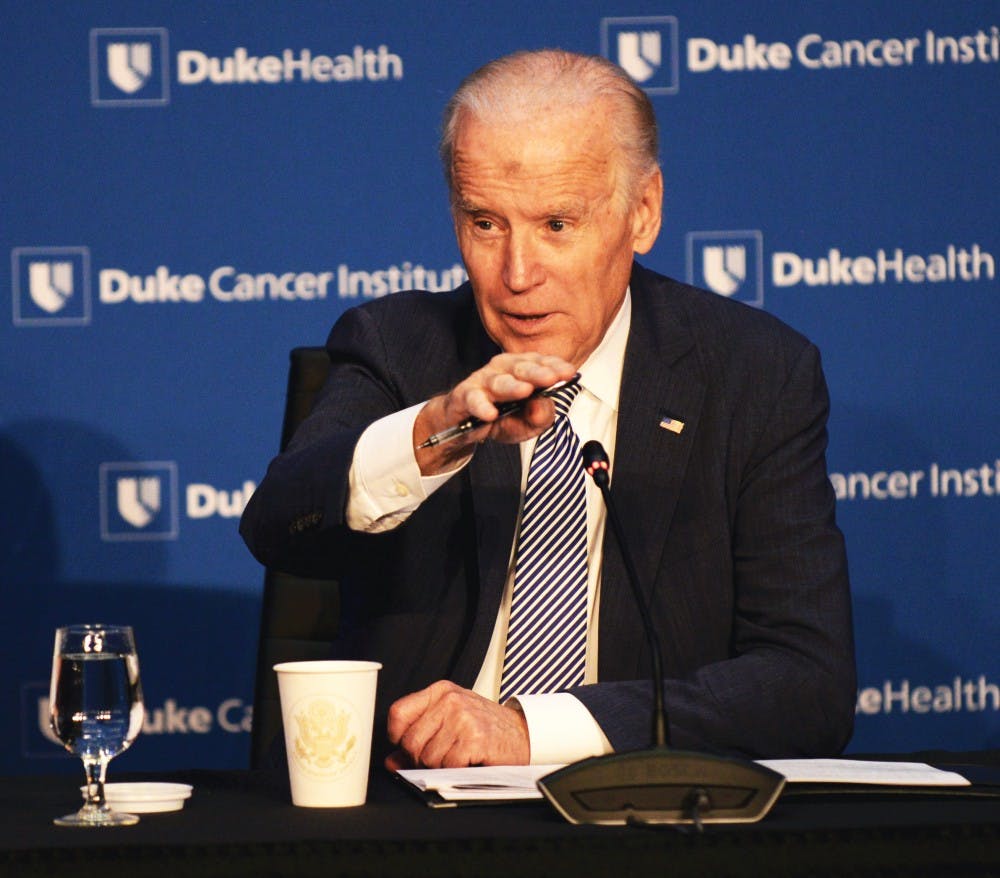After Vice President Joe Biden’s visit to Duke last month, researchers say they are optimistic about the future of cancer research despite many challenges that still exist in the field.
Biden visited the Duke Cancer Institute in February and held a roundtable discussion with cancer experts, physicians and health leaders to help inform the National Cancer Moonshot. President Barack Obama announced the initiative in his State of the Union address earlier this year. Biden said that with the initiative, which he will lead, he aims to achieve “a quantum leap on the path to a cure” by increasing government funding and focusing on cutting-edge approaches to treating cancer.
Dr. Steven Patierno, deputy director of the DCI and professor of medicine, said the current rate at which cancer research has progressed is unprecedented, but that he has reservations about whether research has the political support necessary to achieve the moonshot initiative’s goals.
“I think that the vice president’s visit was emblematic of his personal commitment to cancer research and its future, and I think it reflects the broad sentiment of Congress to want to invest in biomedical science,” Patierno explained. “But I think we still have to wait and see how that’s going to actually play out over the next few years.”
Susan Braun, CEO of The V Foundation for Cancer Research, which has given more than $5 million in grants to the DCI since 1994, attended the roundtable with Biden. She said that the discussion was important because it provided the vice president with expert opinions.
“I also believe it was a very realistic conversation,” Braun said. “It does not appear that what they’re doing is about publicity. It’s about being able to use the time left in office and about what he can bring to the table with his personal experience, even after he’s no longer a part of the administration, to keep a focus on improving the already great momentum in cancer research.”
Biden said during his visit that the initiative—which aims to accelerate progress that would have taken 10 years into a five-year period—is timely because cancer research is currently at “an inflection point.”
Patierno and Dr. Shelley Hwang, chief of breast surgery at the DCI and professor of surgery, confirmed that the scientific community has made many promising breakthroughs recently in studying and treating cancer.
“I think strategies for cancer treatment and the research portfolio have really changed dramatically in the last two years,” Hwang said. “We’ve started to see huge successes [in immunotherapy], and there’s a lot of opportunity to extend this.”
Patierno added that he sees reports unveiling new understandings of cancer’s causes and potential leads in targeting it at the molecular level on a weekly basis.
Despite the current level of scientific promise, cancer research still faces many challenges in optimizing its potential, the biggest of which is creating enough political will and commitment to invest in research, Patierno explained.
“From the scientific perspective, it could not possibly be a more exciting and fruitful time in cancer research,” he said. “Unfortunately, that’s not meeting with full engagement by the political establishment and those who are the decision-makers on funding for biomedical research.”
Research funding for the National Institutes of Health has remained stagnant for more than a decade, and the question of future political investment under a new president remains uncertain—as it is not a topic that is currently being addressed by presidential candidates, Patierno said.
Patierno added that conducting basic science work, discovering new drug targets for potential medications, disseminating findings and treatments to communities and educating the public about cancer risk factors are critical areas that require investment from the government and public.
Hwang also emphasized the importance of translating research findings to help those in developing countries tackle the global burden of cancer.
“The rate of discovery in cancer is faster than it’s ever been,” Patierno added. “But this is a very daunting disease that is part and parcel with life, particularly with aging, so we need to balance the investment. We don’t want to forget that prevention is the best cure and to continue to educate people, minimizing their risk of even getting cancer in the first place.”
Braun and the researchers said that the concept of Biden’s moonshot initiative holds a lot of exciting potential for the future of cancer research, and that his personal commitment was clear from his visit to campus.
“Generally speaking, the scientific and medical community is grateful for the attention the cancer moonshot brings to cancer research and biomedical research,” Patierno said.
He added that, despite Biden’s optimism, scientists have to be pragmatic about what can be achieved in a short time.
“We always want to be cautious to not over-promise and under-deliver—we also want to be realistic,” Patierno said. “I think that the discoveries that are being made right now are transformative. But each discovery is built on a series of discoveries that preceded it, so science is almost always incremental. But cumulative discoveries can come together to from a transformative moment and can fuel a tipping point.”
Get The Chronicle straight to your inbox
Signup for our weekly newsletter. Cancel at any time.

